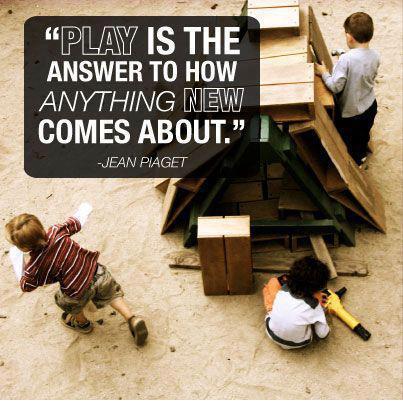
This quotation from twentieth-century education theorist Jean Piaget — “Play is the answer to how anything new comes about” — reminds me of a passage from seventeenth-century philosopher John Locke’s Some Thoughts concerning Education.
“Great care is to be taken, that [education] be never made as a business to him, nor he look on it as a task. We naturally, as I said, even from our cradles, love liberty, and have therefore an aversion to many things, for no other reason, but because they are injoined us. I have always had a fancy, that learning might be made a play and recreation to children; and that they might be brought to desire to be taught, if it were proposed to them as a thing of honour, credit, delight, and recreation, or as a reward for doing something else, and if they were never chid or corrected for the neglect of it.”
To my knowledge, Locke is the first modern theorist to emphasize liberty and play as foundational to education. Locke is in contrast to two of the great classical theorists of education, Plato and Augustine, who emphasize compulsion, obedience, and punishment as foundational. In Plato’s Allegory of the Cave, learners are compelled to stand and forced to turn and move toward the light, and Augustine famously said Per molestias eruditio (“True education begins with physical abuse”). A century after Locke, Immanuel Kant explicitly disavowed the view that education should be based on the student’s “inclination” and argued that it should be based on obedience and duty.
So: play versus top-down structure, self-motivation versus compulsion, recreation versus duty, liberty versus obedience. And the debate goes on.
To my knowledge, the best current education psychologist working this territory is Peter Gray, whose book Free to Learn is excellent.
Related:
Plato on education.
John Locke on education.
Immanuel Kant on education.
Obedience in education in 1700s Germany.
Are babies born to dance?
Sugata Mitra on child-driven education.
I seemed to recall Plato discussing play and learning in a positive way, one presaging Locke and Montessori on this. A little googling and I found the section that made me think this.
Republic, Book 7 (from internet classics archive)
“And, therefore, calculation and geometry and all the other elements of instruction, which are a preparation for dialectic, should be presented to the mind in childhood; not, however, under any notion of forcing our system of education.
Why not?
Because a freeman ought not to be a slave in the acquisition of knowledge of any kind. Bodily exercise, when compulsory, does no harm to the body; but knowledge which is acquired under compulsion obtains no hold on the mind.
Very true.
Then, my good friend, I said, do not use compulsion, but let early education be a sort of amusement; you will then be better able to find out the natural bent. ”
( http://classics.mit.edu/Plato/republic.8.vii.html )
Good point, Shawn. Two thoughts in response to Plato’s remarks about play, one philosophical and one historical.
Philosophical: (1) The Book VII discussion comes after the Book IV discussion of the myth of the metals. There Plato outlines the three types of souls (gold, silver, iron), and identifies the role each soul-type has in serving the state. (2) In Book VII, then, there’s first a general question of education and here, e.g., in the Cave Allegory, the language is all compulsion. (3) Then Plato turns to the best education for the best soul-type, math being a key subject. He says here that “the business of us who are the founders of the State will be to compel the best minds to attain that knowledge which we have already shown to be the greatest,” and that once the best minds have been so educated “they must be made to descend again among the prisoners in the den.” So it’s all compulsion and duty so far. (4) Then he raises the question of sorting: How do we find out which children have the best soul-type? As a sorting device he then suggests play: We make all children study math, and then for awhile we let them play with it to see which few of them have a natural aptitude for it. The few naturals will then be tracked for higher education and leadership while the rest tracked in other ways. (5) So Plato’s mention of play is nested within a broader framework of compulsion and obligation and is only for the purpose of sorting the students. Also his discussion of freedom in that context is not a political freedom but a cognitive freedom from ignorance.
Historical: It’s the authority-compulsion-duty-hierarchy version of Plato that has been most influential on education theory and practice over the centuries. Though sometimes a kinder, gentler interpretation of Plato has sway, e.g., as among some Renaissance humanists.
sir i need a book of jean peaguet on the importance of play for children